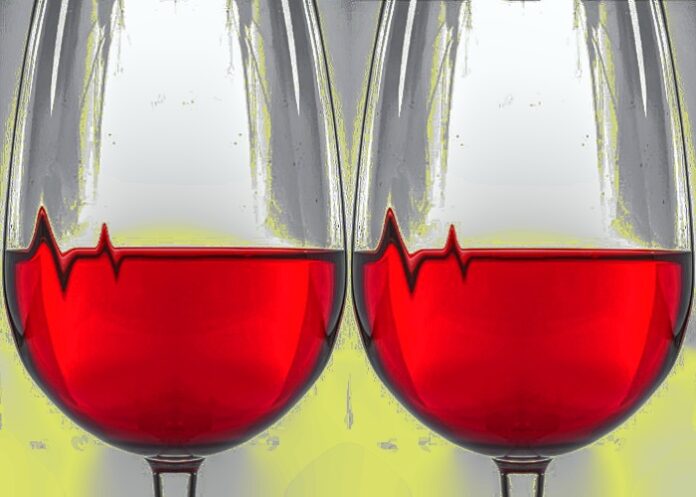Adults can exceed their recommended daily limit of sugar by drinking just two glasses of wine, experts in the United Kingdom have warned, reports PA Media in The Guardian. Drinks can also be packed with calories and in some cases two glasses of wine can contain more calories than a hamburger.
The Alcohol Health Alliance UK (AHA) said product labelling on alcoholic drinks was “woefully inadequate” as it published new analysis of popular wines.
It looked at the calorie and sugar content of 30 bottles of red, white, rosé, fruit and sparkling wine sold in the United Kingdom, reported PA Media on 16 February 2022.
The AHA, which represents more than 60 health organisations, said there was a wide variation of sugar and calories across different wines, but that with this information missing from most labels, consumers were “being kept in the dark” about what they were drinking.
It said that government guidelines recommend that adults consume no more than 30g of so-called free sugars a day, but that it was possible to reach almost this entire amount by drinking two medium glasses of wine.
The AHA analysis suggested that many of the most sugar-packed wines were the ones which had the lowest strength of alcohol, the PA Media story continued.
It said that with no legal requirement to display sugar content on alcohol labels, drinkers may opt for a lower-strength alcohol thinking that this is a healthier option but could unwittingly be upping their daily sugar intake.
The analysis also examined the calories in wine. The AHA said that just two medium-sized glasses of the most calorific wines analysed contain more calories than a McDonald’s hamburger. Wines with high calorie content also tended to be higher-strength drinks.
The AHA said that none of the 30 products examined in the study displayed sugar content on their labels – information which is required for all non-alcoholic drinks, according to the PA Media. Calorie content was only displayed on 20% of the labels examined.
Professor Sir Ian Gilmore, chair of the AHA, said: “Alcohol’s current exemption from food and drink labelling rules is absurd. “Shoppers who buy milk or orange juice have sugar content and nutritional information right at their fingertips.
“But this information is not required when it comes to alcohol – a product not just fuelling obesity but with widespread health harms and linked to seven types of cancer.
The PA Media story continues: “The government must publish its planned consultation on alcohol labelling without further delay – which we have been waiting for since 2020.
“As well as calorie labelling and nutritional information, we need prominent health warnings and the UK chief medical officers’ low-risk weekly drinking guidelines on labels. Studies suggest that this could help reduce alcohol harm by increasing knowledge of the health risks and prompting behaviour change.”
Alison Douglas, the chief executive of Alcohol Focus Scotland, added: “Alcohol labelling is woefully inadequate in this country and allows the alcohol industry to decide what information it will and won’t include on its products, despite alcohol claiming the lives of 70 people a day in the UK.
“The alcohol industry have dragged their feet for long enough – unless labelling requirements are set out in law, we will continue to be kept in the dark about what is in our drinks. People want and need reliable information directly on bottles and cans, where it can usefully inform their decisions.”
Alcohol Health Alliance
Sugar content in wine revealed: Health experts deem alcohol labelling ‘woefully inadequate’
The Alcohol Health Alliance published an article, including statistics, on 16 February outlining findings of the analysis it commissioned into the sugar content in wine. An excerpt follows below:
Health experts are calling for better alcohol labelling as it is revealed that wine can contain anywhere between 0g and 59g of free sugars per bottle.
Member organisations of the Alcohol Health Alliance commissioned an independent laboratory to analyse 30 bottles of red, white, rosé, fruit and sparkling wine from the top ten leading wine brands in the UK.
The results exposed the wide variation of sugar and calories between products. With this information missing from most alcohol labels, drinkers are being kept in the dark about just how much sugar and calories are in the products they buy.
The analysis found that the products containing the most sugar tended to be the lower-strength wines. With no legal requirement to display sugar content on alcohol labels, drinkers opting for a lower-strength alcohol choice, perhaps thinking this is a healthier option, are unwittingly upping their daily sugar intake. This can lead to an increased risk of health conditions such as type-2 diabetes and tooth decay.
Alcohol is very energy dense, with just two medium-sized glasses of the most calorific wines analysed containing more calories than a McDonald’s hamburger. What’s more, higher calorie content is linked to higher strength drinks which are the most damaging to our health. Alcohol consumption is linked to seven types of cancer, including bowel and breast cancer.
For those who drink, alcohol accounts for nearly 10% of their daily calorie intake, with around 3.4 million adults consuming an additional day’s worth of calories each week – totalling an additional two months of food each year.
None of the 30 products examined in this study displayed sugar content on their labels; information which is required for all non-alcoholic drinks. Calorie content was only displayed on 20% of the labels examined. Those wanting to know how many calories or how much sugar is in their drink, would be unable to find all the information they need on the majority of product labels.
This lack of information means that drinkers have no idea what they are consuming.
Link to the full Alcohol Health Alliance article below.
See also from the MedicalBrief archives
Women now drink as much as men – And are prone to sickness sooner
Harmful use of alcohol kills millions annually – WHO global report
Red wine fights fat and improves memory

